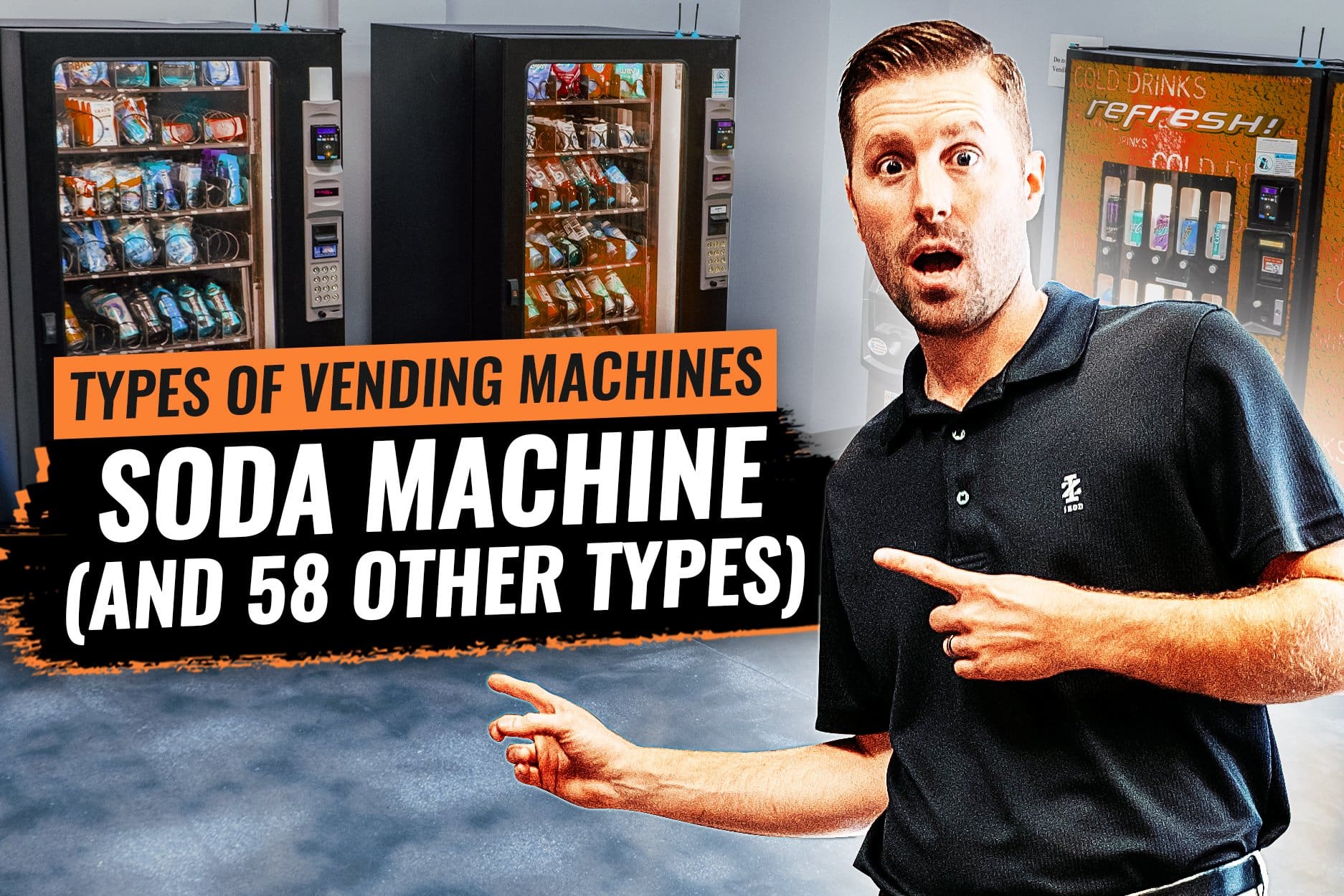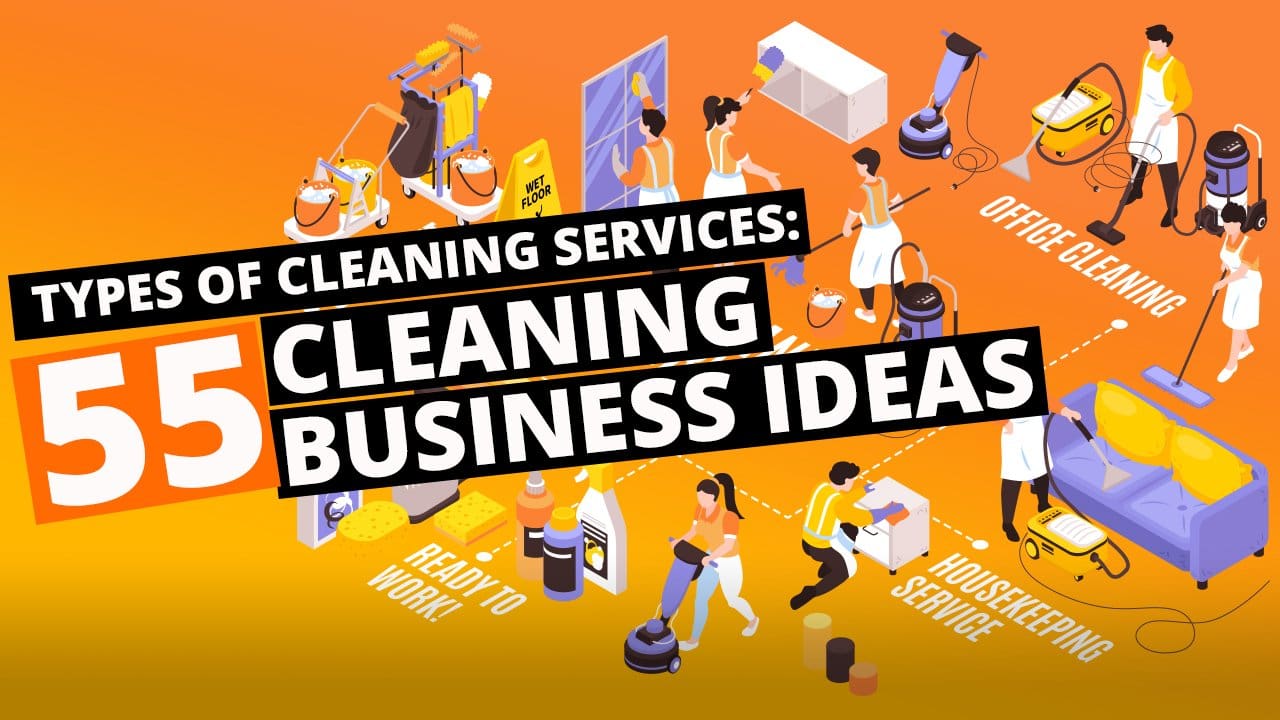Are you looking to start a vending machine business? Maybe you’d like to add new machines to your business. Either way, we’ve got you covered with 59 types of vending machines to help you grow your vending machine empire!
We talked with Adam Hill of Hill Vending to learn everything we could about starting a vending machine business. He shared tips on his favorite brands of machines and where to get them. We combined that with research to find a variety of machines and help differentiate a vending machine business.
We’ll answer questions like:
- What Did the First Vending Machine Dispense?
- How Many Types of Vending Machines Are There?
- What Are Primary Types of Vending Machines?
- What Are Other Types of Cool Vending Machines?
Let’s start exploring the world of vending machines.
What Did the First Vending Machine Dispense?
According to Smithsonian Magazine, the first vending machine was created in the first century A.D. to provide controlled pours of holy water at temples because people took more than they paid for. I can’t say I am shocked that people tried to cheat the system that long ago, but I am surprised that the design is remarkably similar to more modern vending machines created in the late 1800s and early 1900s. The process was:
- Someone puts a coin in the top of the machine
- Coin falls onto a balance beam with a string tied to a pitcher (see graphic)
- Machine dispenses holy water
- Coin falls off
- Pouring stops
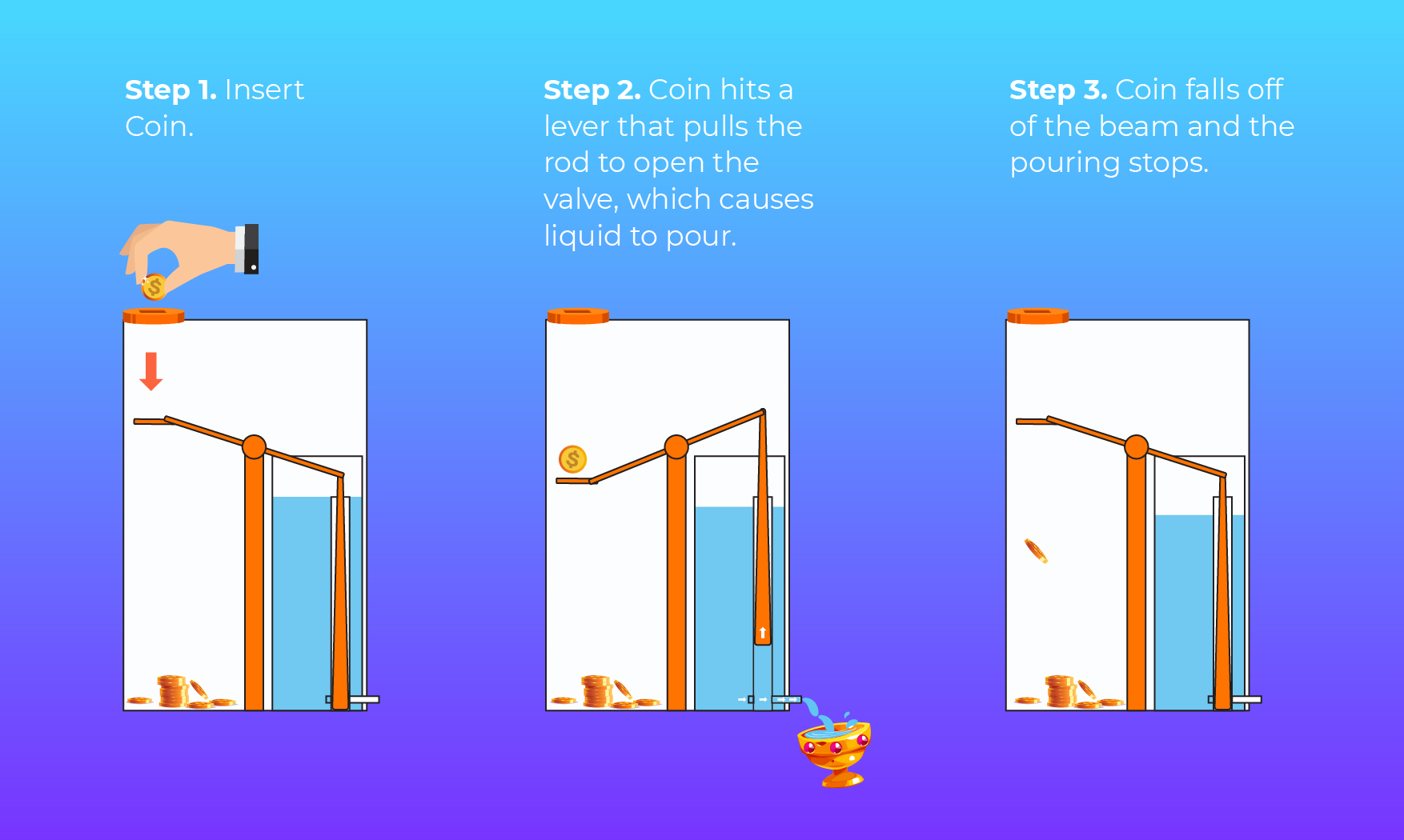
How Many Types of Vending Machines Are There?
The world contains too many vending machines to count them all, but I found 59 types of vending machines to share with you.
In fact, you can find a vending machine for just about anything because vending machine suppliers will gladly build you a custom machine. Anything you could possibly sell, there are vending machines to sell them.
What Are the Different Types of Vending Machines?
The primary types of vending machines are:
- Snack Vending Machines
- Cold Drink Vending Machines
- Hot Drink Vending Machines
- Combo Machines
- Gum Ball Machines
- Smart Vending Machines
- Bulk Vending Machines
- Hot Food Machines
- Cold Food Machines
- Small Vending Machines
- Custom Vending Machines
- Specialized Vending Machines
Adam told us:
Check out our interview with Adam below:
We’ll discuss these and many more to help you decide what types of vending machines are best for your vending machine business.
1. Snack Vending Machines
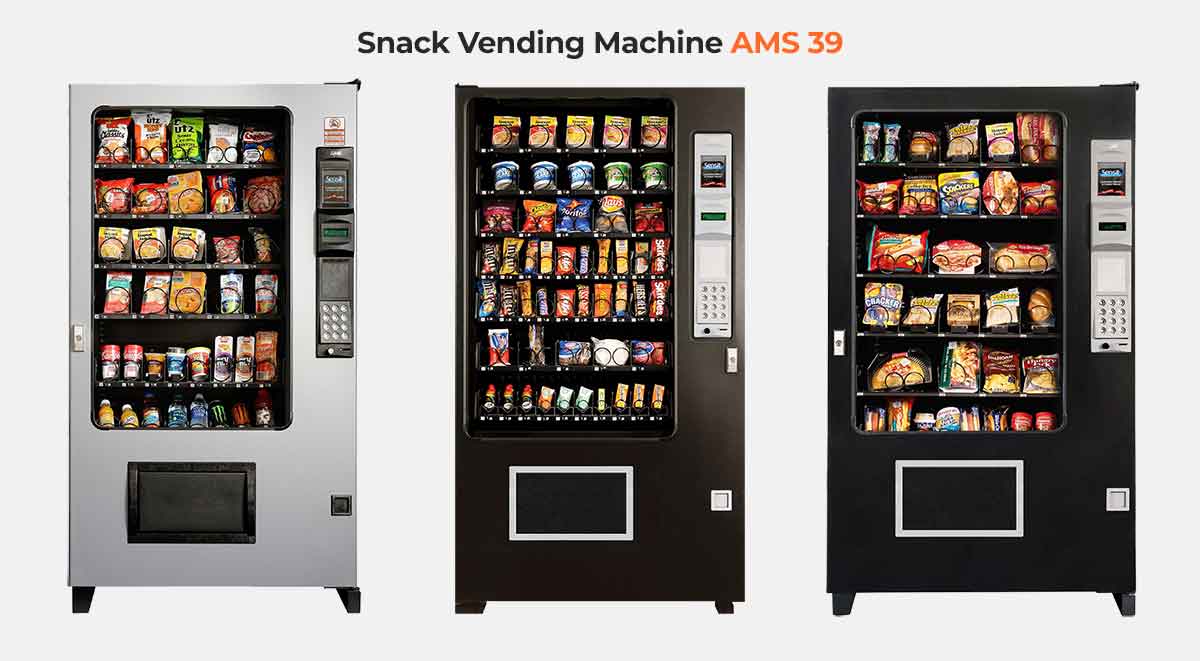
Snack machines are one of the most common types of machines for a vending machine business. As Adam said:
When you buy a snack machine, you’ll want to consider options like:
- Condition: You can buy a new, used, or refurbished snack vending machine.
- Number of Slots: Each type of vending machine has a different number of snacks it can hold. The AMS Classic Snack (pictured below can hold an average of 617 snacks.
- Payment Options Available: Regardless of the type of vending machine you choose, you’ll need to be able to accept cash, card, coin, and touchless pay (ApplePay). If you buy an old vending machine, you might be unable to upgrade and accept cards.
- Brand: Sticking with a single manufacturer helps you build a relationship and saves you money.
Now that we’ve discussed snack machines, let’s look at soda vending machines.
2. Soda Vending Machines
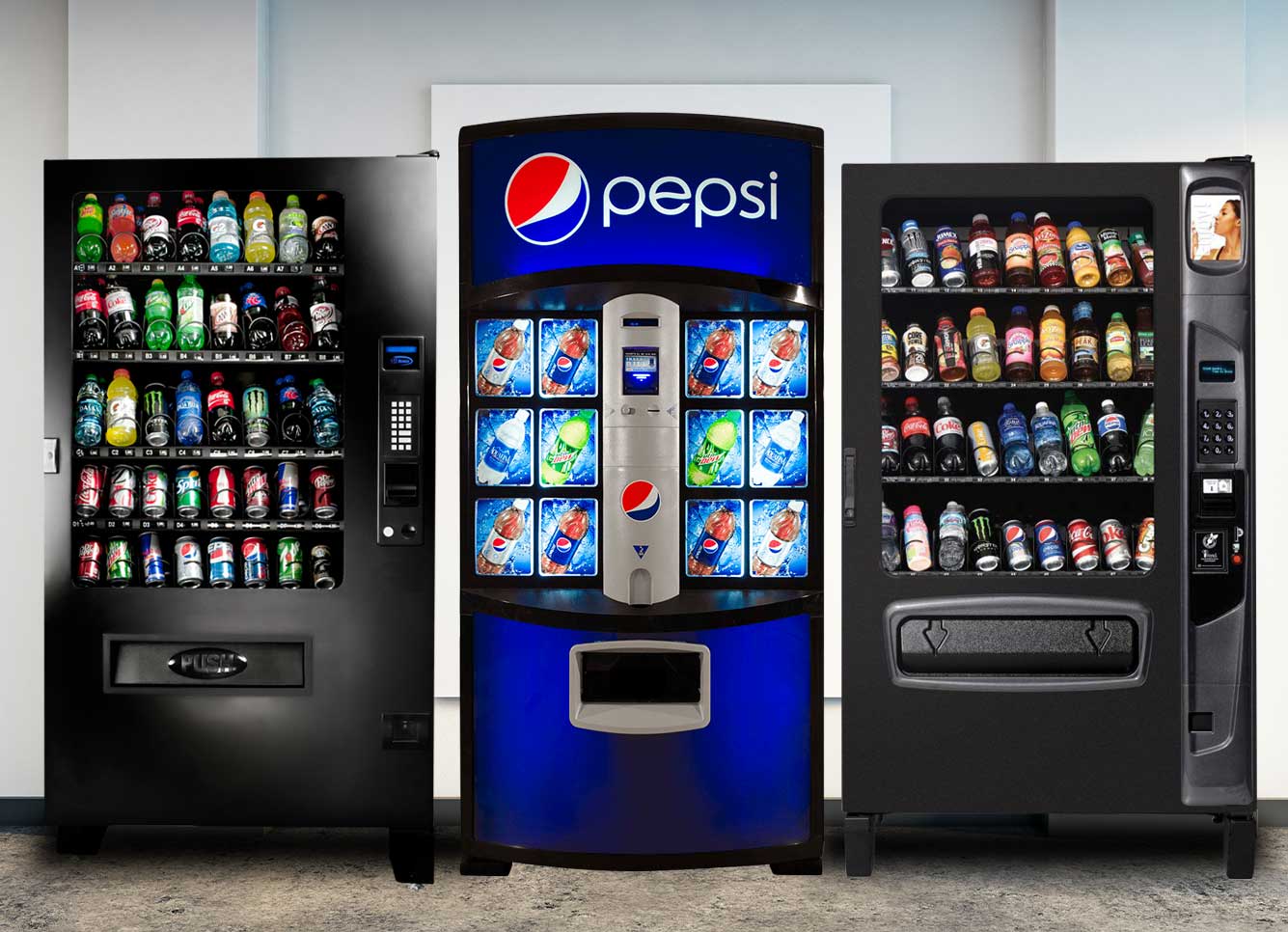
Soda vending machines have refrigeration decks that sell:
- Soft drinks
- Energy drinks
- Bottled water
We see these drink machines almost everywhere we go. There are a variety of drink machines you can offer for selling soft drinks. The four main types are:
- Coin-operated vending machines
- Coolers
- Freestyle machines
- Fountains and dispensers
You can buy them used or partner with manufacturers like Coca-Cola or Pepsi that sell drinks to get new machines.
3. Hot Drink Vending Machines

Vending machines that serve hot drinks like coffee and tea are also popular. These vending machines will normally look similar to the one below, but you can also get custom-made ones based on your interests. These work well in places like office settings.
You can also offer hot drink dispensing machines at gas stations. eVending.com offers the coffee vending machine below with financing for approximately $7 per day.
4. Combo Machines

Put snacks and drinks in one machine. These make it easy to provide food and drinks to self-service workplaces. Vendo machines offer up to 70 slots for food and soft drinks in a single machine. Alternatively, you could go for the AMS Multitasker, which can hold bags of chips, candy, sandwiches, bottled drinks, and cans of soda. They advertise that Multitasker holds over 200 items.
5. Gum Ball Machines
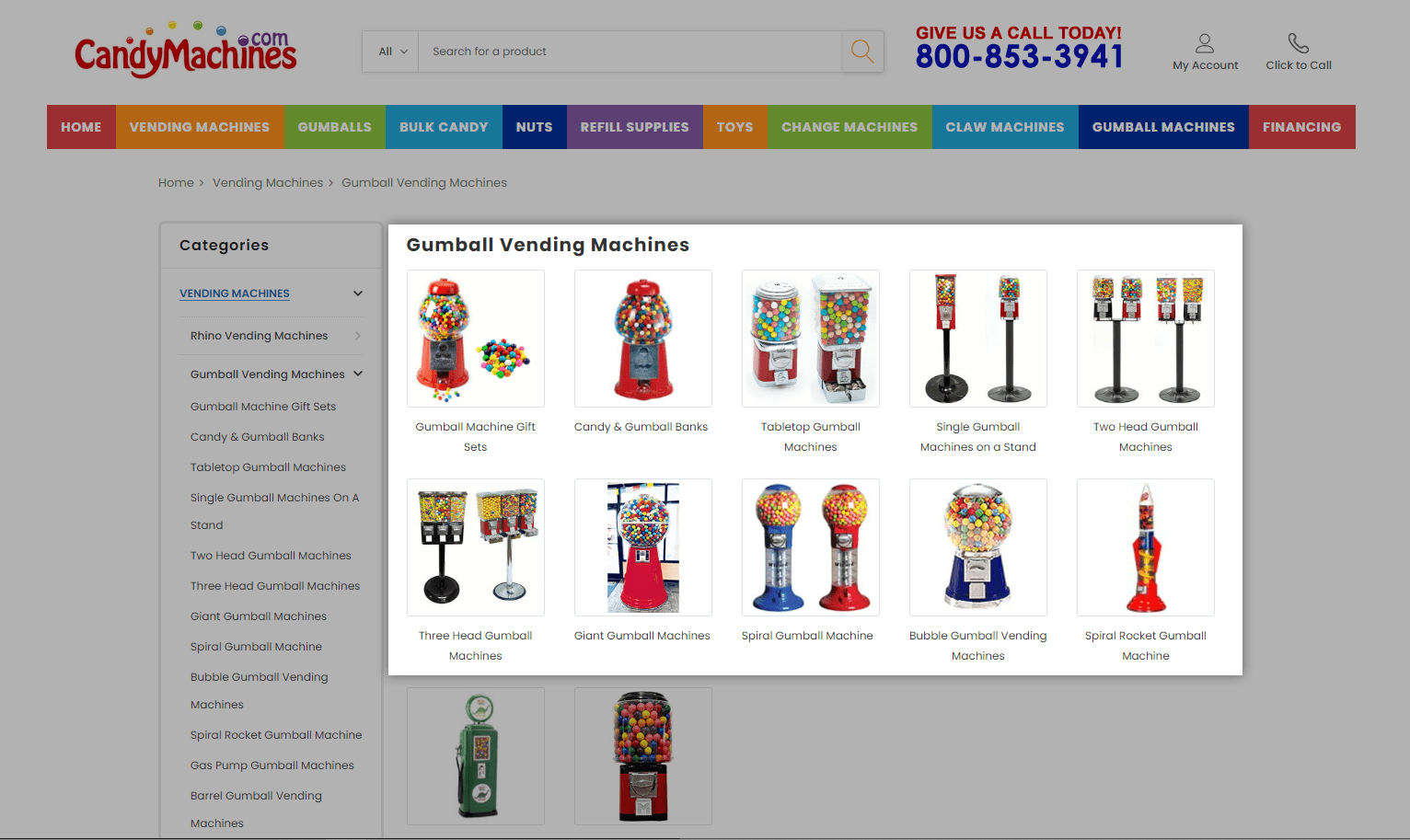
If your vending machine business includes retail stores en route, a bubble gum machine makes a ton of sense. Kids love them and they come in a variety of styles.
10 Types of Gumball Machines
According to candymachines.com, there are ten types of gumball machines you might want to consider for your vending machine business.
- Tabletop Gumball Machines
- Single Gumball Machines on a Stand
- Two Head Gumball Machines
- Three Head Gumball Machines
- Giant Gumball Machines
- Spiral Gumball Machine
- Bubble Gumball Vending Machines
- Spiral Rocket Gumball Machine
- Gas Pump Gumball Machines
- Barrel Gumball Vending Machines
Check out the slides below to learn more about each of these types of machines for a vending machine business.
6. Smart Vending Machines
A smart vending machine, or touch screen vending machine, is a step above standard vending machines. They use technology like inventory management software, social networking, and communicate with smartphone apps to make it easier to run your automated retail locations.
7. Campbell Soup SnackBot Quiz Vending Machines
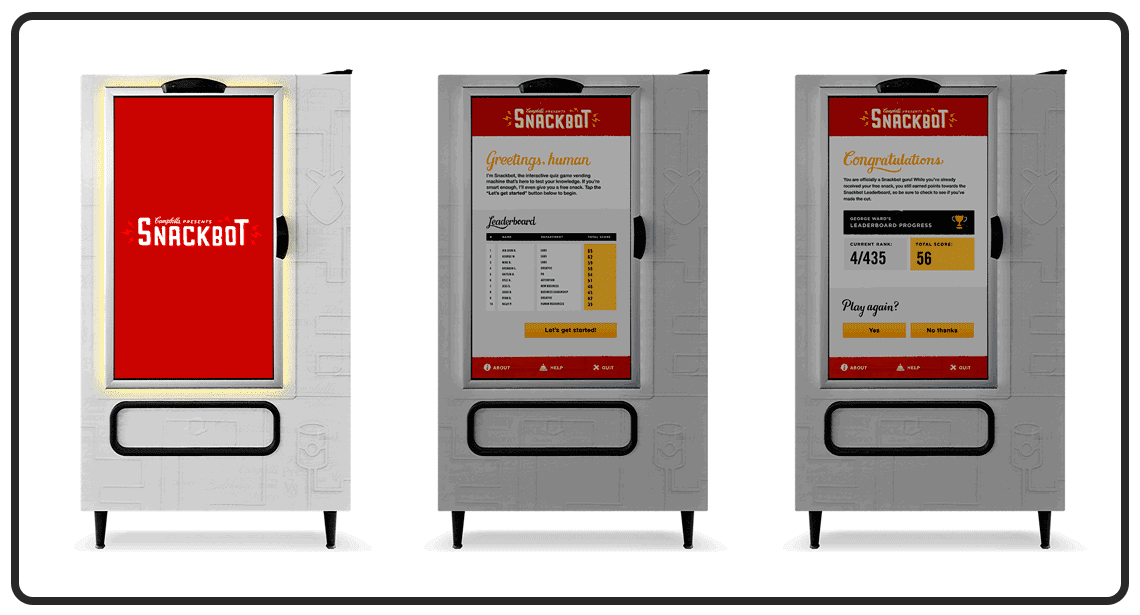
Combine your vending machine business with interactive quizzes. The Snackbot is used by Campbell’s Soup to quiz employees on the company’s culture. If they get two out of three answers right, it’s a free lunch. Can you imagine what this would do for culture building in office settings?
8. Vending Machines with Social Networking
If you offer vending machines in high-traffic locations with different target audiences, you can use automated retail with social media activation. These types of vending machines offer business owners the chance to encourage customers to share items they bought with their smartphone apps. You can specifically tailor inventory to sports events, concerts, and other types of events all from one machine.
Check out Innovative Vending Solutions to learn about social media-connected machines.
9. Bulk Vending Machines
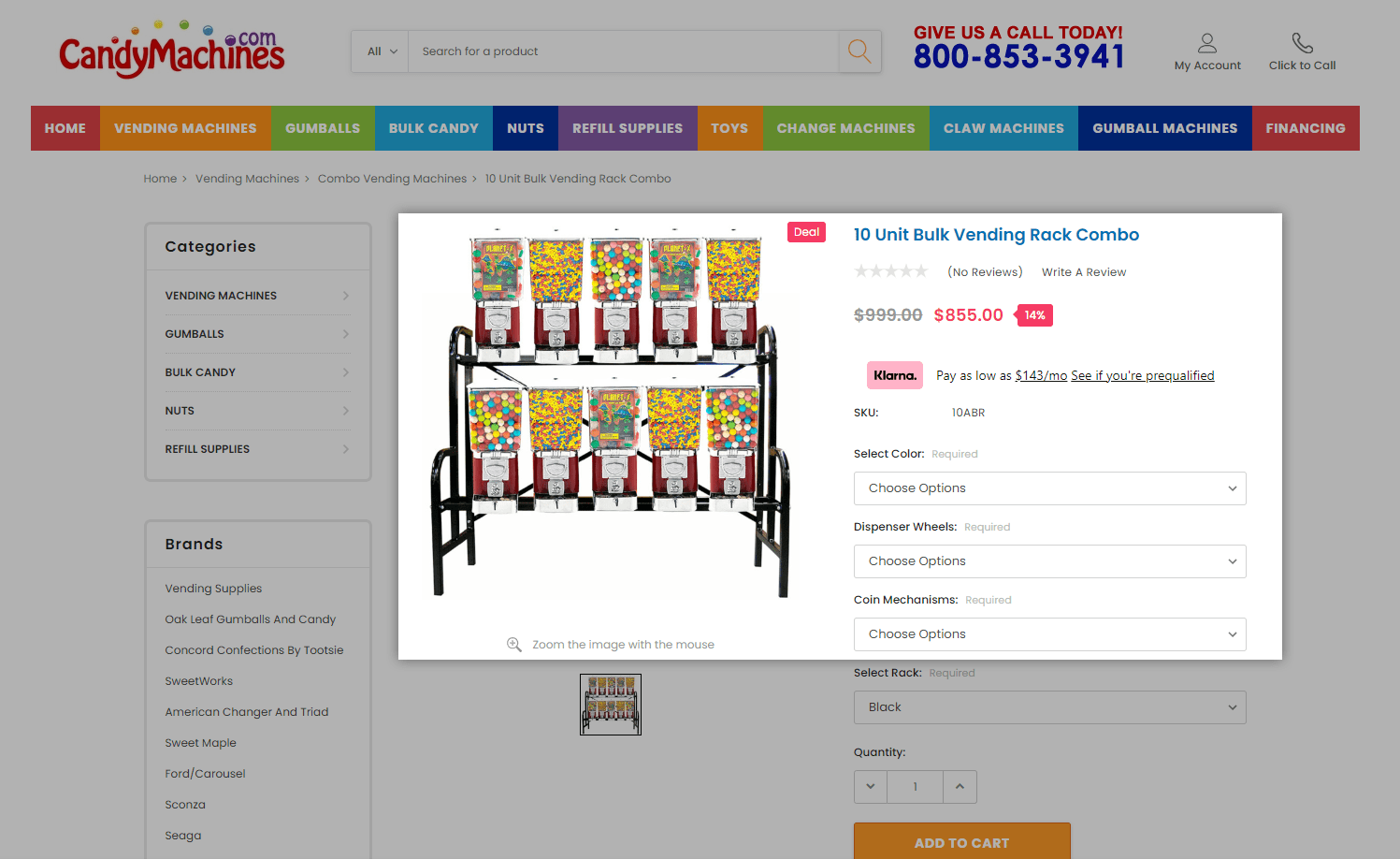
Bulk machines can hold items like:
- Bulk candy
- Small toys
- Nuts and other small snacks
You can buy racks with up to 10 bulk dispensers to offer various snacks, gum, and toys.
10. Hot Food Vending Machines
Hot food vending machines help you sell foods like:
- Hot dogs
- Burritos
- Pizza
- Hamburgers
- French fries
Consider a unique vending machine that serves hot food like the ones below.
11. Hot Dogs Vending Machine
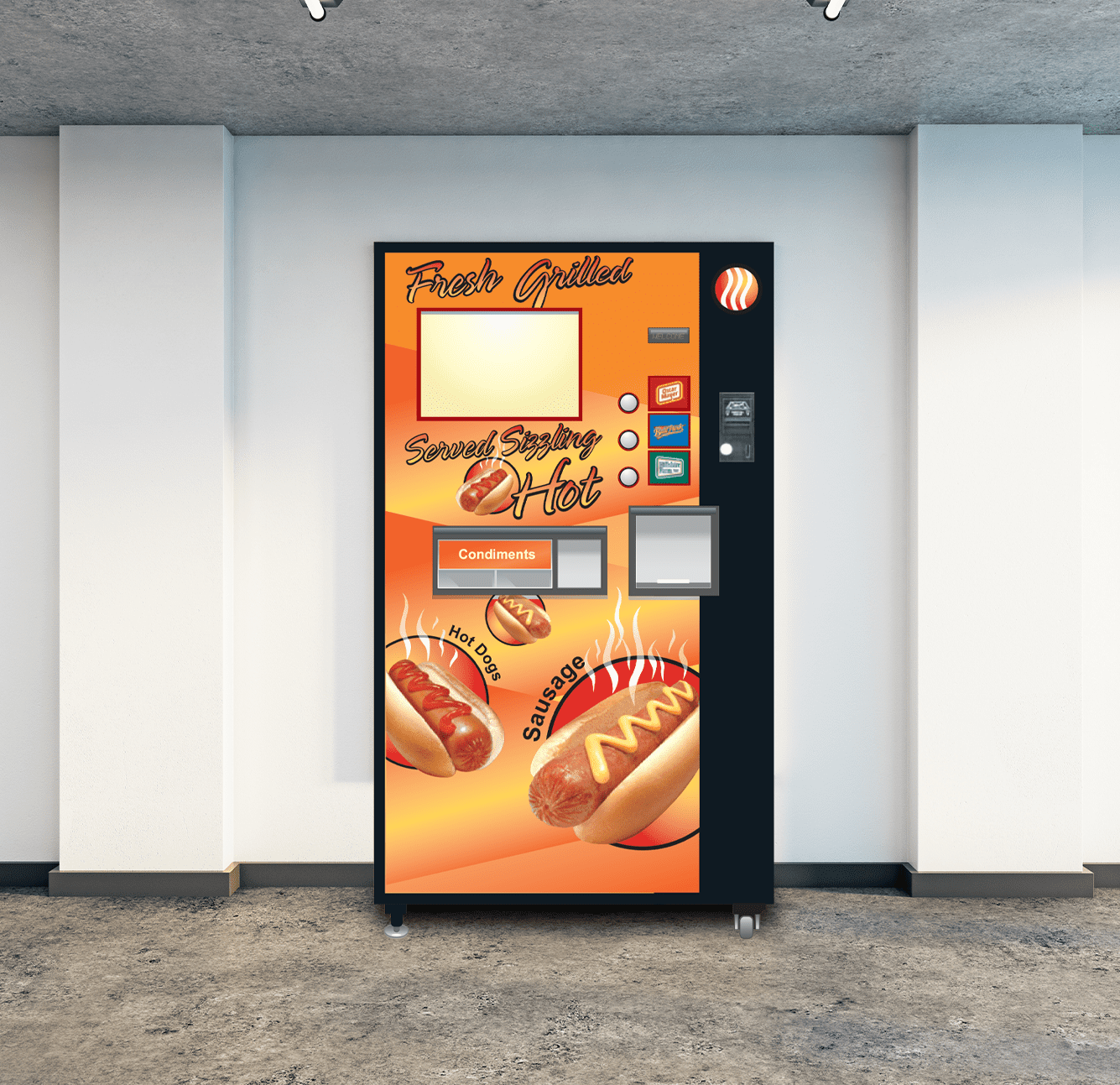
LHD Vending Systems created a machine that sells fresh hot dogs and sausages. It can hold up to 480 juicy wieners and 300 buns. Plus, you can add condiments and napkins dispensers. If you live in a town with a sports teams, I bet you could pay for one of these after a couple of sports events.
12. Burrito Box Vending Machines
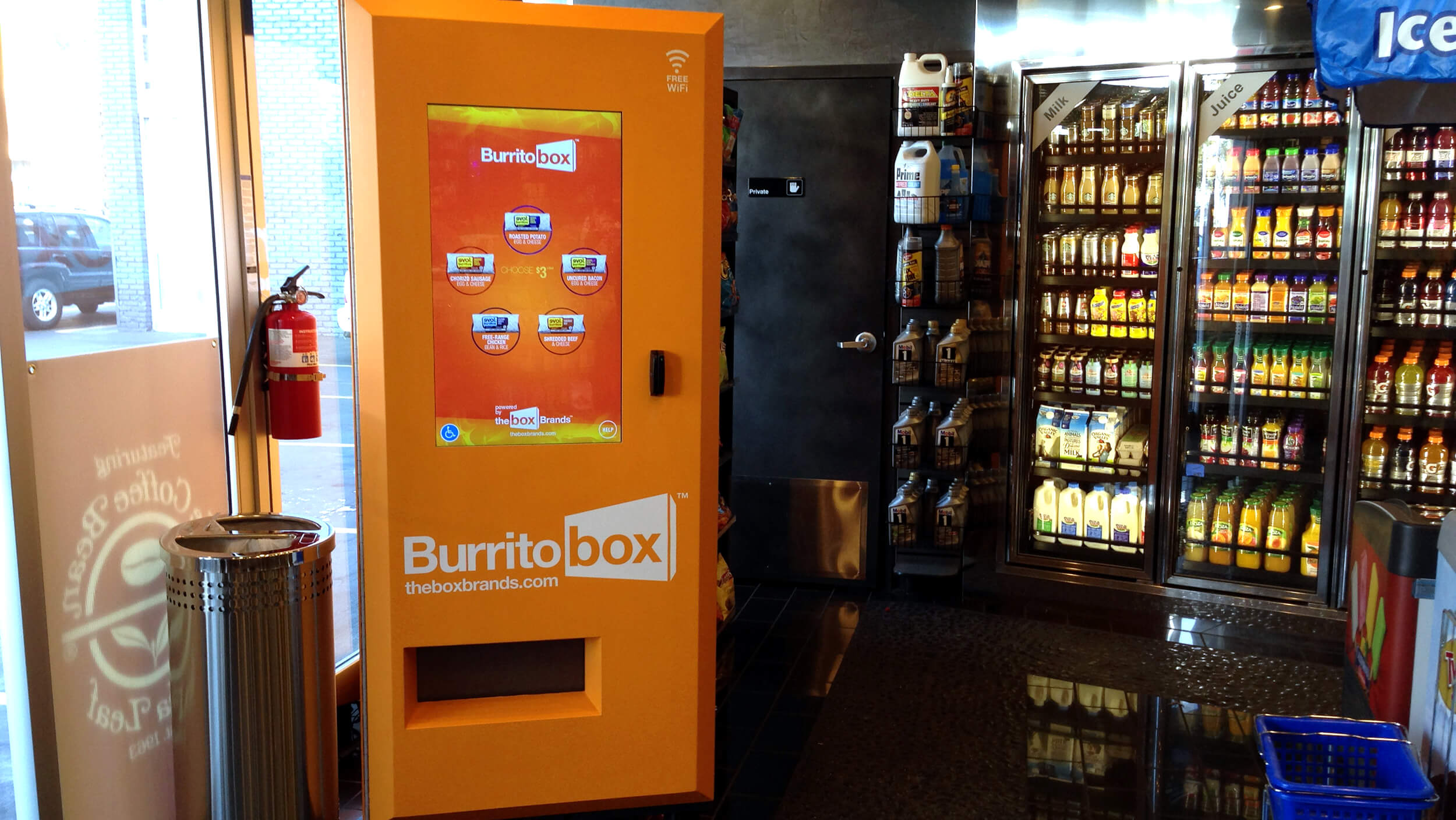
The Burrito Box is a custom smart vending machine that serves hot burritos and plays music while it cooks them. You can try it out if you are in West Hollywood, California or convince them to allow you to offer machines in your area.
Unlock the Secrets to a $58K/Month Vending Business! |
|
| Want to know which vending machines make the most money and where to find them? Adam Hill built a $58K/month vending empire—and now he’s sharing everything he knows in the UpFlip Academy. Learn insider tips to avoid costly mistakes, secure profitable locations, and choose machines that best fit your market. Adam’s step-by-step training takes you from beginner to vending pro in no time. | |
| Join the UpFlip Academy! | |
13. Pizza Vending Machines
I don’t know about you, but I love pizza! You can get a pizza vending machine from a vendor like Let’s Pizza. The pizza machine vending process takes three minutes to create the dough, add toppings, cook, cut, and box a full pizza. That’s super cool! Check out their video below:
14. Hamburger Vending Machines
If pizza isn’t your thing, how about hamburgers? There are vending machines that will cook a fresh burger with toppings—even toasting the bun! It’s an exciting time to be a vending business owner. Check out the RoboBurger video below:
15. 7-Eleven Mashed Potato Vending Machine
I have no idea if this is any good or not but Maggi, a subsidiary of Nestle, and 7-11 convenience stores partnered to create a mashed potato dispensing machine. Gas stations get away with some crazy things because they are high-traffic locations. If it’s as good as their brownies, be careful. They’re addictive.
16. French Fry Vending Machine
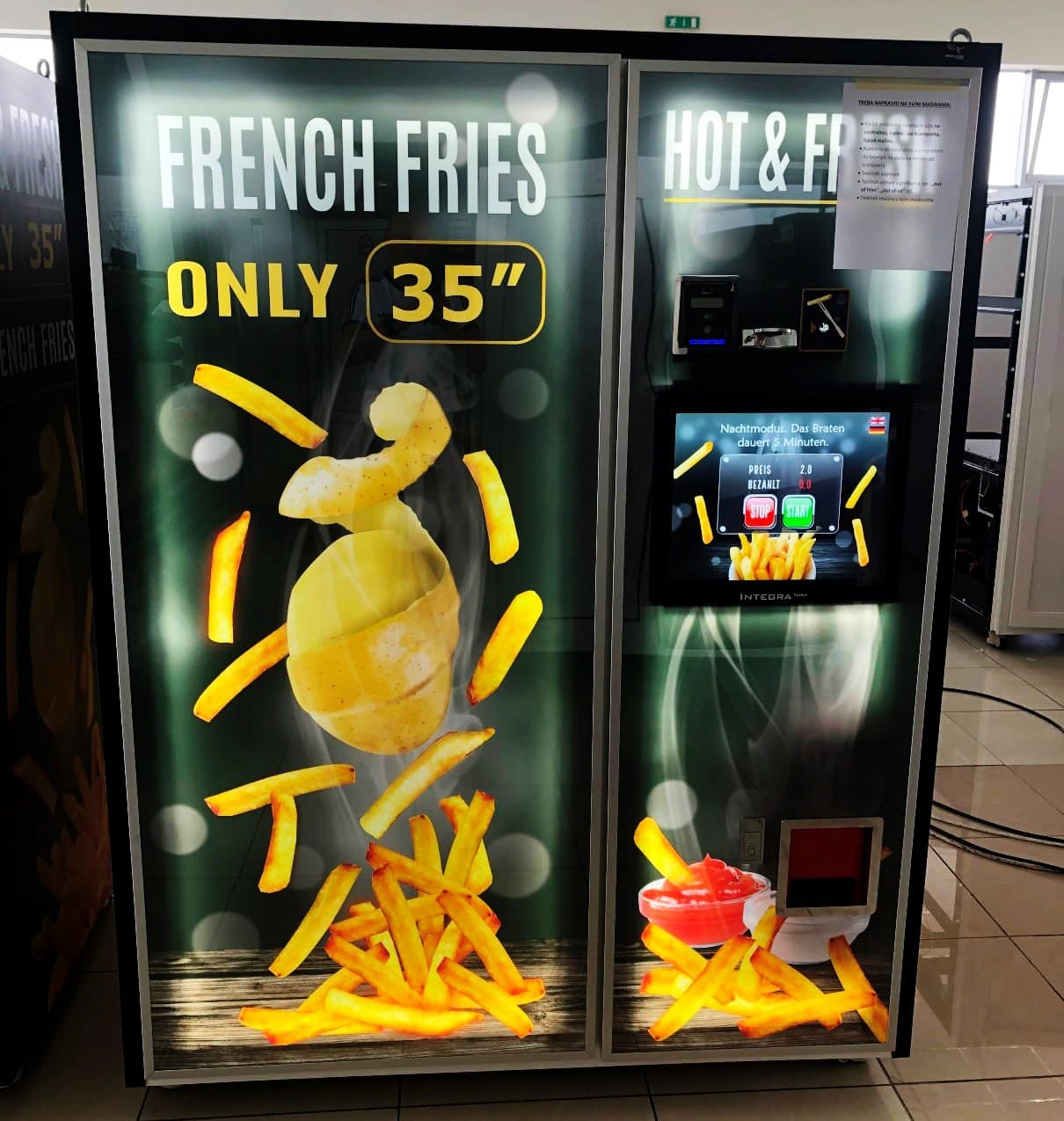
French fries are another one of my favorite foods. This fresh french fry vending machine is made by a European company, so we’ll have to excuse them for using the inches symbol to display seconds. Their machines cook fries in 35 seconds and their website is awesome! Check out Integra Systems.
17. Cold Food Machines
Cold food machines come with a refrigeration deck to keep food at lower temperatures. This type of vending machine can be broken down further into:
- Refrigerated Vending Machines
- Frozen Food Vending Machines
- Ice Cream Vending Machines
- Multi-Zone Vending Machines
We’ll look at each of these machines to help you understand how they are different.
18. Refrigerated Vending Machines
Refrigerated vending machines are perfect for sandwiches. Make sure to check the temperatures of the machines when ordering them because most food and drinks need to stay between 32 and 40 degrees for cold food.
You’ll also need this type of vending machine if you operate at outdoor visitor attractions where the products would melt in the heat. These will normally be a combo machine that can be used for:
- Soda Vending
- Snack Machines
- Sandwich Vending Machines
- Prepared Meals
Refrigerated machines offer increased features and add-ons including weather protection, glass heating elements, and vandalism protection devices that help maintain the life of the vending machine in outdoor visitor attractions. They come with a much higher cost and Adam told us:
Consider a machine from AMS if you choose to go this route.
19. Frozen Food Vending Machines
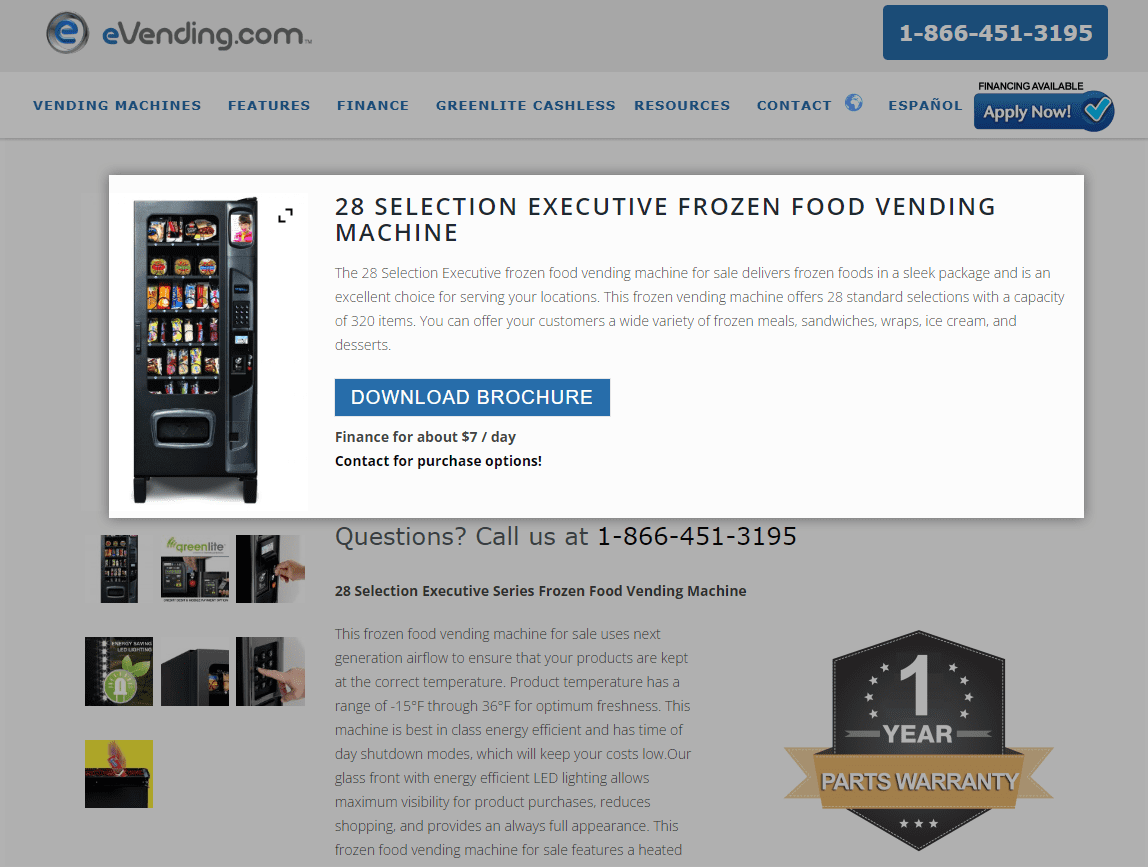
A freezer vending machine is designed to keep food below 32 degrees Fahrenheit. These are perfect for selling frozen snacks like ice cream. I could also see them being used to serve frozen margaritas in places that you have to be over the drinking age to enter. eVending.com offers frozen food machines with financing from $7 a day.
20. Ice Cream Vending Machines
There are two ways you can serve ice cream. The first is using the machines above, but if you want a different type of vending machine, consider dispenser machines from iCream.
A dispenser machine will serve ice cream or soft serve (and toppings) into a cup based on the customer’s selections. These machines are sure to delight kids when they dispense an order.
Check out this news feature where they test the product:
Ice cream vending machine dispenses soft serve fast | KTLA
21. Multi-Zone Vending Machines
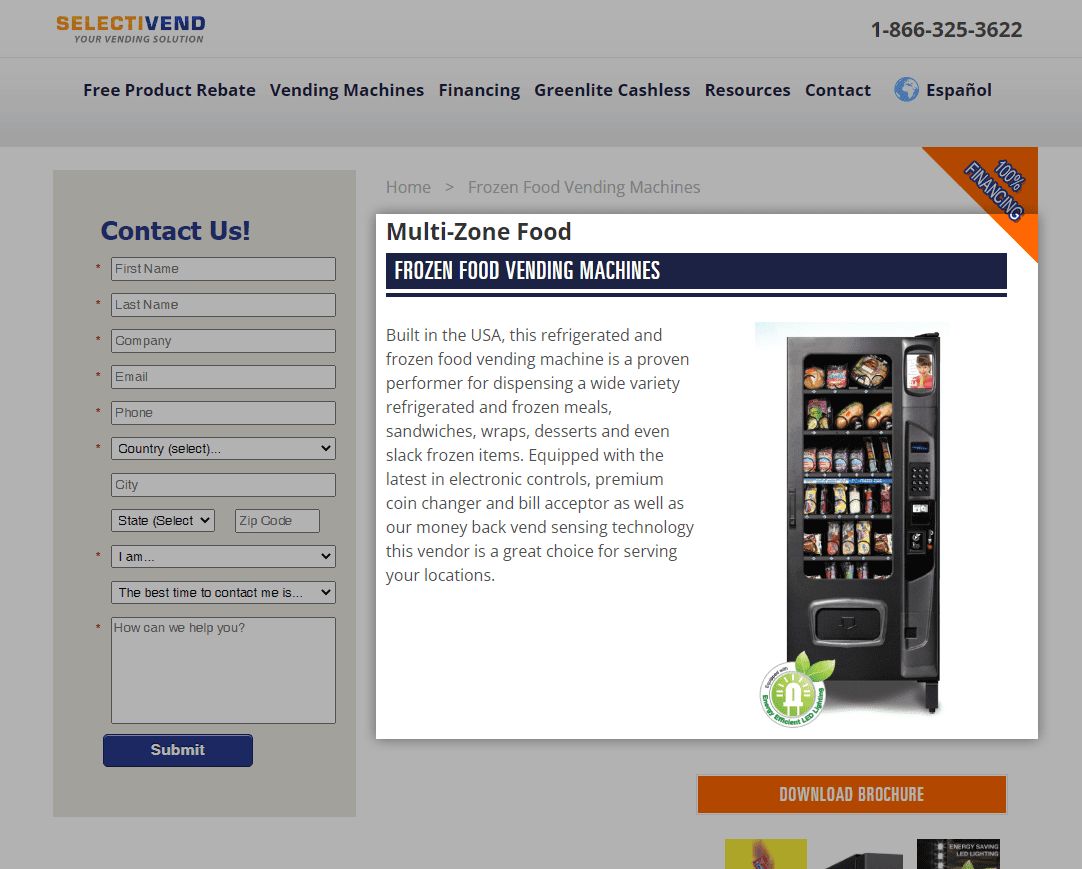
If you want one machine where you can serve cold food, soft drinks, and frozen food, you’ll want machines with dual-zone capabilities like the SelectiVend cold and frozen food combo vending machine pictured below. It allows you to set the temperature for each row to offer a combination of refrigerated and frozen snacks. Learn more.
22. Cigarette Vending Machine
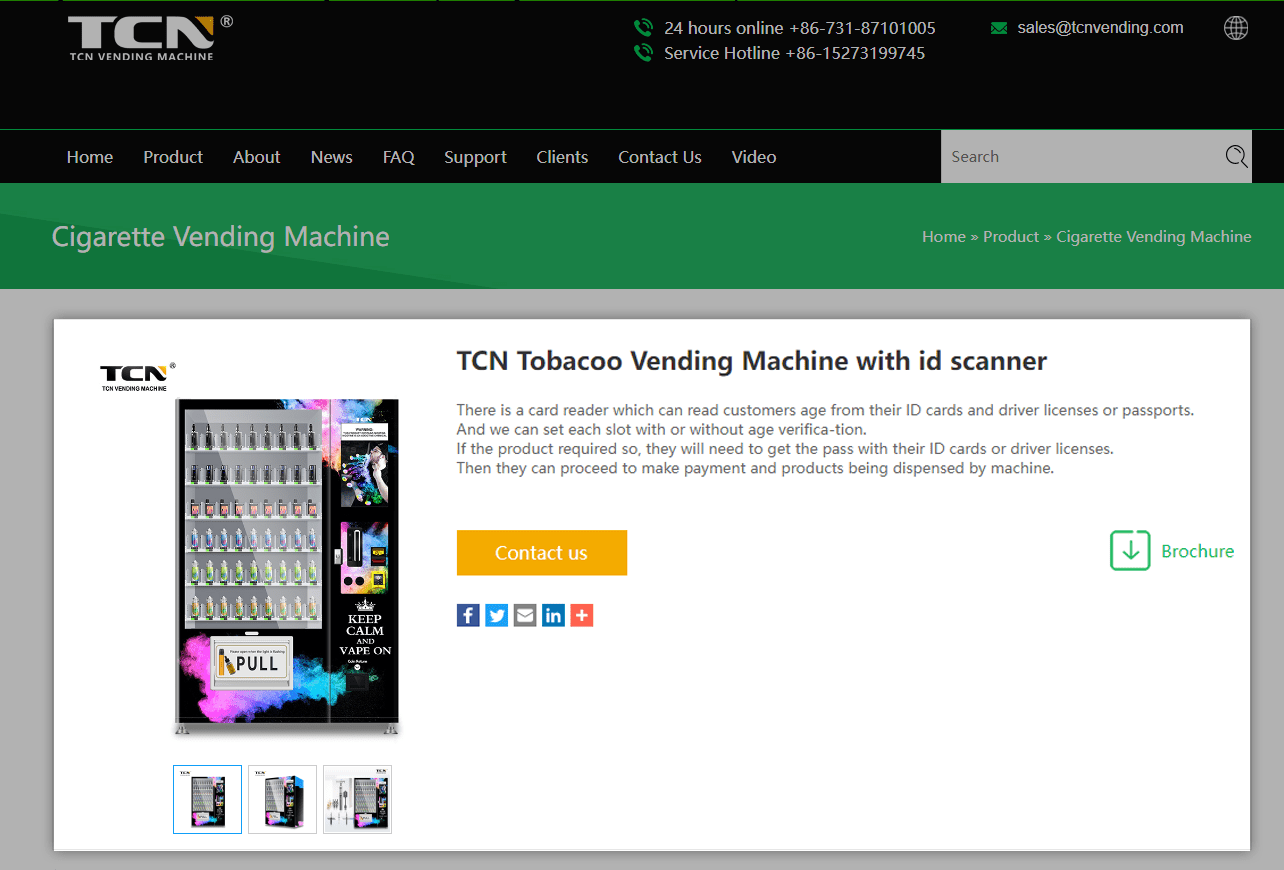
A cigarette vending machine is used in places like casinos and bars to provide a convenient customer experience. These machines are less common than in the past because many locations no longer allow smoking. Most machines will be similar to AMS C36, but if you get one like the TCN vaping machine, you can perform automated ID checking, preventing sales to minors.
23. Small Vending Machines
These are exactly what they sound like. They are miniature vending machines. They might be wall-mounted vending machines like the ones from Digital Media Vending or the bulk candy vending machines we discussed earlier.
24. Used Vending Machines
If you buy an existing vending machine business, you’ll likely purchase at least one used vending machine. In our UpFlip Academy course about how to start a vending machine business, we’ll discuss purchasing existing routes.
Make sure to sign up if you want to learn the whole process of inspecting a used coin-operated machine thoroughly. Keep reading to learn more about other vending machine options.
25. Custom Vending Machines
Most of the time when a company refers to custom vending machines, the machines offer:
The machines offer a way to differentiate your machines from everyone else, but normally use the standard shells that you see with the most common vending machines. If you want something different than an existing vending machine model, you’ll probably want to go with a specialized vending machine. We’ll discuss those next.
26. Specialized Vending Machines
These are unique vending machines that companies manufacture based on the needs of the business. The best example of a specialized vending machine is the Loose Leaf Tea vending machine pictured below.
27. Loose Leaf Tea Vending Machine
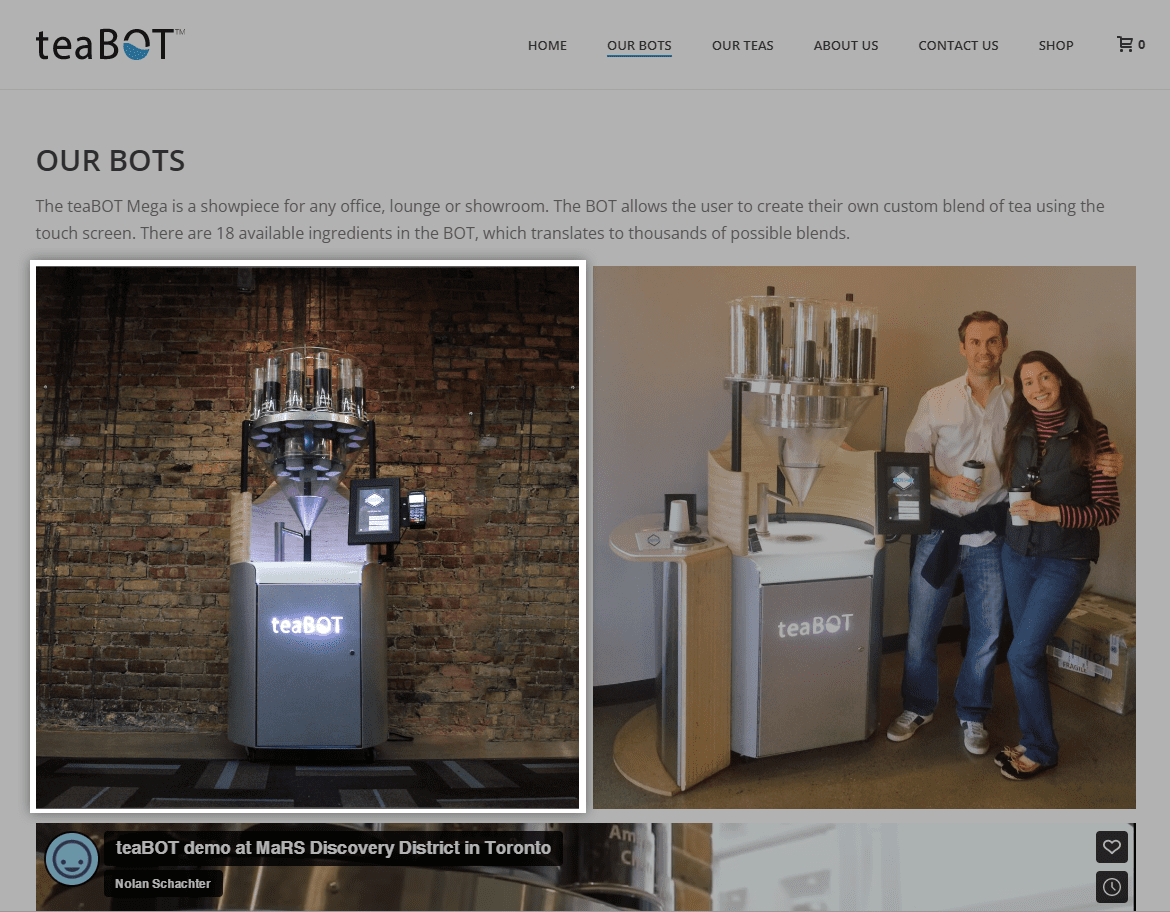
Watch this vending machine percolate tea right in front of you. It’s definitely an eye-catcher. This is one of the coolest vending machines I came across in my research. I was not able to find the manufacturer which leads me to conclude this was a custom build.
The rest of this blog will be filled with examples of cool vending machines that business owners have created for their automated retail businesses.
Cool Vending Machine Options
Looking for something more unique than the various snack machines, drink machines, or combo vending machines? Check out some of these creative types of vending machines.
28. Gold to Go Vending Machines
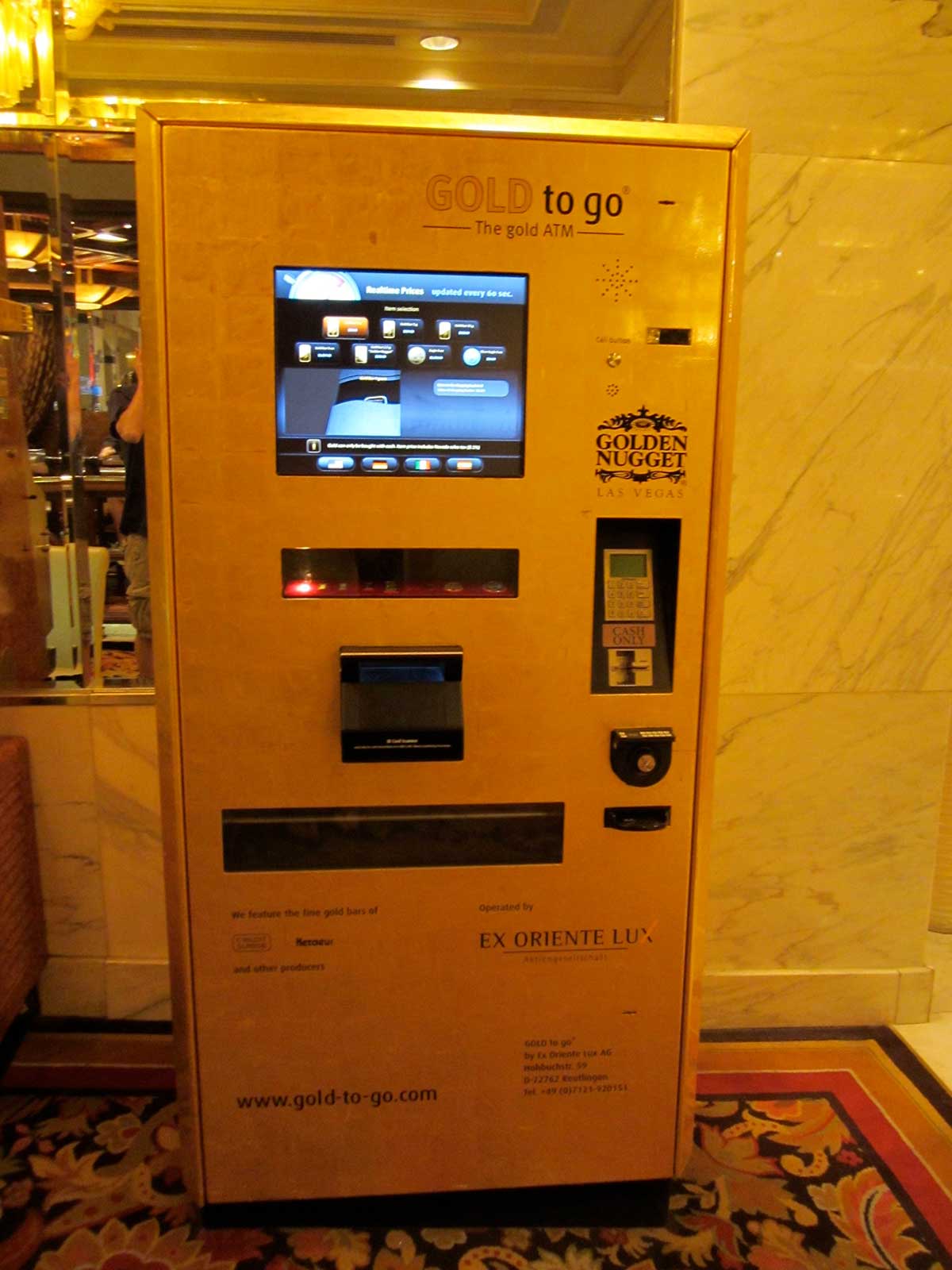
If you’re looking for an example of a vending machine for a high-end customer, look no further than the Gold to Go Machine in the Dubai Mall. These machines vend 24-Karat Gold in the form of gold jewelry, bars, and coins. Delight your customers with a glitzy high-end machine.
29. Shoe Vending Machines
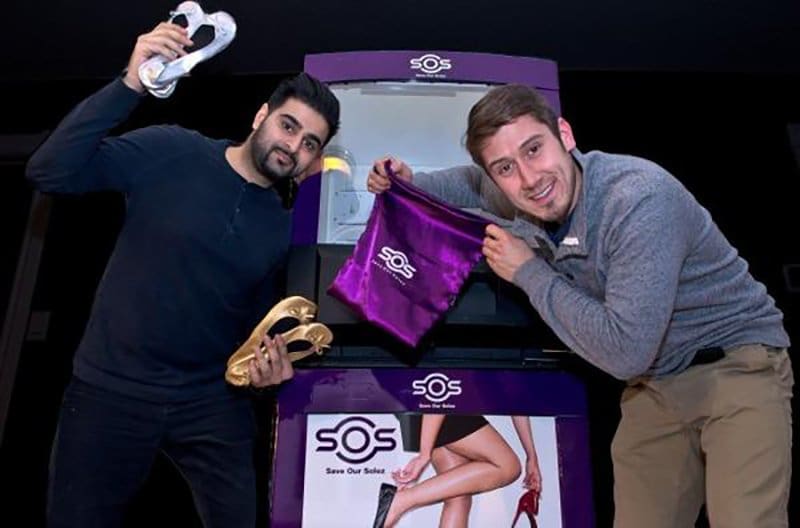
I live in Vegas, and these are everywhere! Casino hopping often means walking a mile, which I can only imagine is hard to do in high heels. After a night of drinking and partying, these machines save ankles. If you’re in a tourist location, you might want to consider adding one of these models to your vending machine business. RollaSole is the name of the company in Vegas. Save Our Soles is in Canada. Both use custom machine vending.
30. Crab Vending Machines
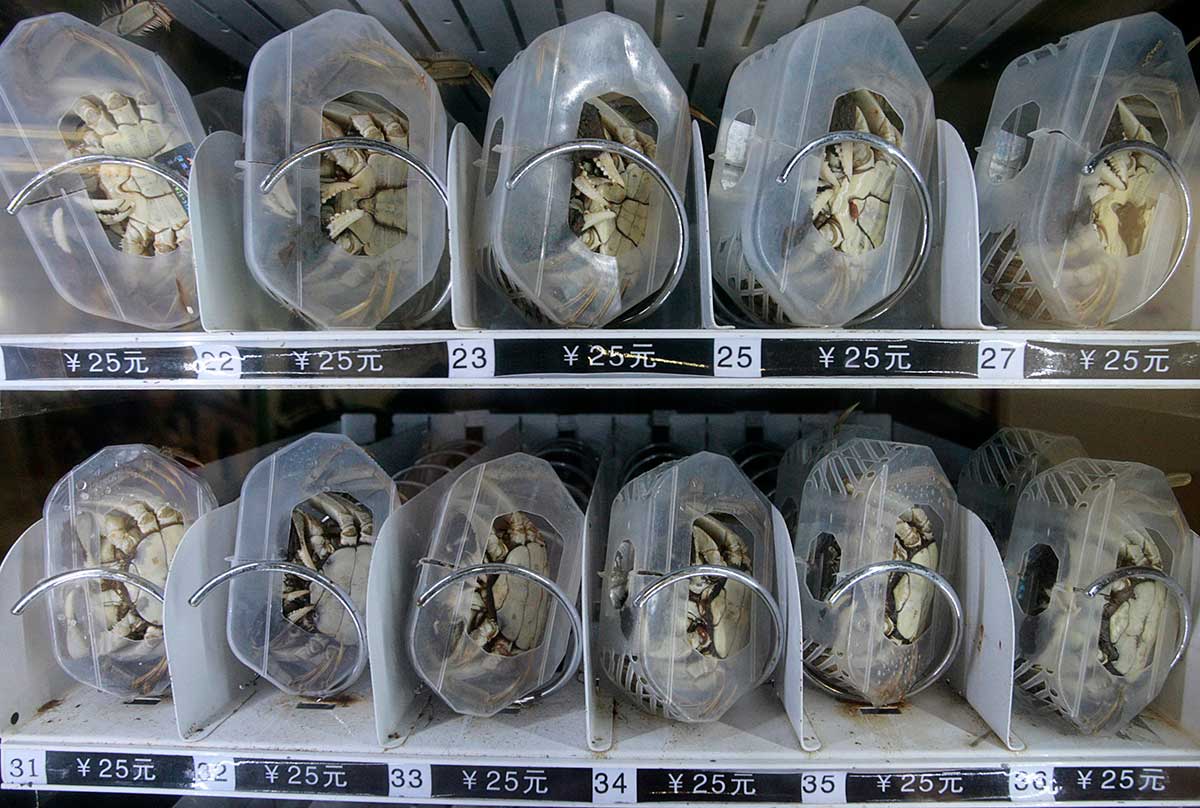
Nanjing, Jiangsu Province in China has vending machines that sell live crabs. These weird vending machines might dispense products that are a little crabby, but keep reading for some fun types of vending machines in the USA.
31. Cupcake Vending Machines
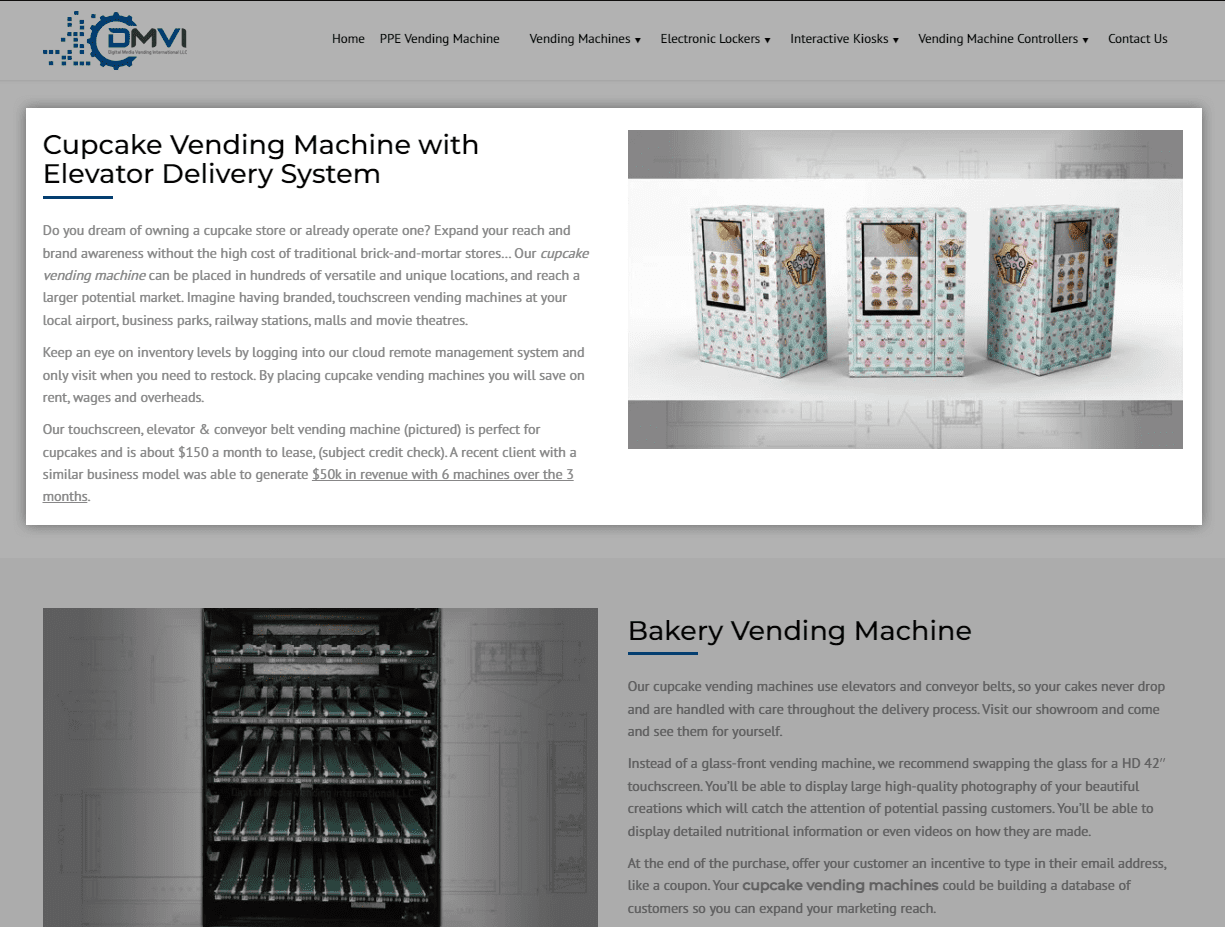
These machines are awesome! They have them in Las Vegas. These are the perfect compliment for a bakery to get more business. You can order them from Digital Media Vending. They claim one of their clients is averaging nearly $5,600 monthly revenue per vending machine.
Alternatively, you can buy a Sprinkles franchise which includes a cupcake vending machine in their stores.
32. Raw Milk Vending Machines
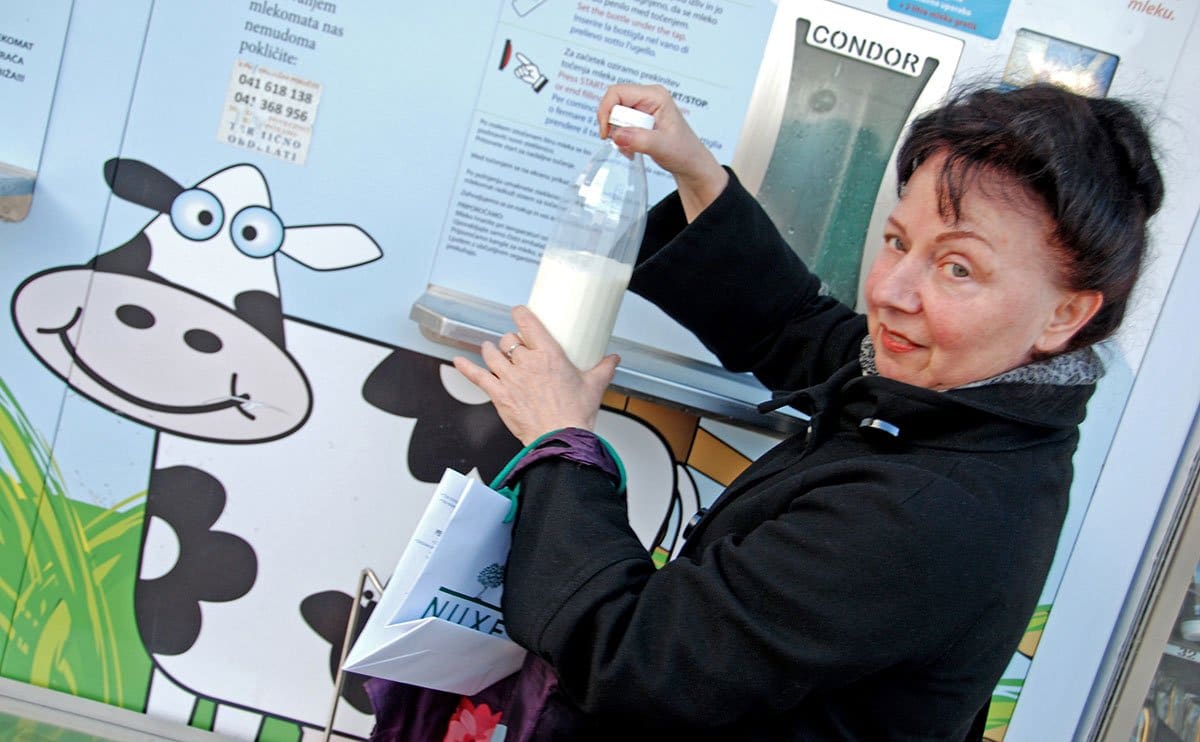
If you know any farmers, you might want to take inspiration from these European vending machines. Lease these drink machines to them and let farmers fill them with their cows’ milk.
33. Beauty Vending Machines
Find inspiration from this existing vending machine model. Start a beauty vending machine business and sell items like braids, makeup, fake lashes, feminine wipes, and other items. You can get your own custom vending machine from Discount Vending.
34. Breathalyzer Vending Machines
If your vending machine business services bars, you might want to consider offering a coin-operated breathalyzer testing machine. Save the bar and its customers from costly lawsuits with a machine like Breathalyzer in Every Bar.
35. Laundry Vending Machines
VendRite specializes in vending machines for laundromats. If you have a route with a laundromat, offer to place a vending machine to help them sell products.
36. Farmer’s Fridge Vending Machines
Some clever machines offer an old-timey look but function as modern vending machines, while others offer a sleek modern facade. Sell healthy food with these self-service workplaces. Reach out to Farmer’s Fridge to do business with them.
37. Hey Buddy Vending Machine Franchises
Pet-friendly combo vending machines offer snacks for customers and their dogs in an adorable vending machine. Offer these at places that are dog-friendly like parks and outdoor spaces to have the most success. You can apply to start a franchise on Franchise America. It costs around $4,200 and up, depending on the number of locations you’ll have. If you buy more than three Hey Buddy machines, you can go to a one-day training at their Dallas office.
38. Moet & Chandon Champagne Vending Machine
Serve everyone’s favorite bubbly with a Moet & Chandon vending machine. You can find this drink machine in London, but I bet they’d love to have them in other classy locations.
39. Condom Vending Machine
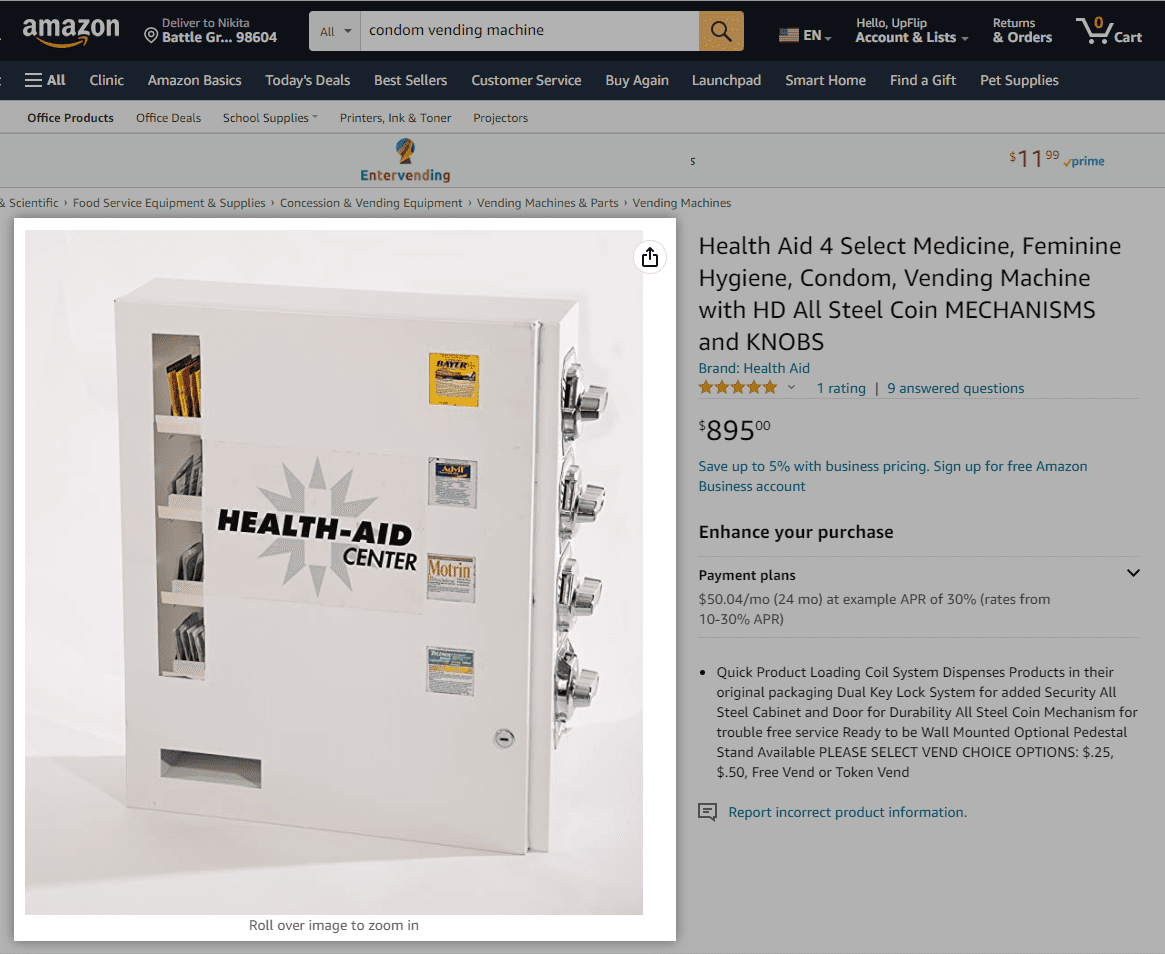
Found in bathrooms around the country, this is a popular method of making sure people practice protection. They are also a popular method for offering products like laundry soap and toiletries for weary travelers. Find condom vending machines from Amazon.
40. Medicine Vending Machine
The link above also works for medical vending machine products like headache medicine, Tums, and other commonly needed products that are safe for vending machine health sales. Make sure not to sell anything that requires a prescription.
41. Beer & Sake Vending Machine
Sports events and outdoor visitor attractions could use beer and sake vending machines to help cut down lines and increase business in high-traffic locations. Remember to make sure the machine has an ID scanner. Keep reading for other examples of unique vending machine business ideas.
42. Sticker Vending Machine
Sticker vending machines are normally similar to bulk candy vending machines, but you could go with a different approach. With a smart vending machine, You could provide a business that accepts peoples’ pictures by text message and prints them on stickers, much like a photo vending machine.
43. Vending Machine Nuts
Nuts are another product you can sell in the same machines as bulk candy, toys, and stickers. They are one of the healthier snacks people can eat, and it even helps some people balance their body chemistry when they eat this delicious snack (I’m one of them. Eating cashews helps with my anxiety and depression.)
44. Berdoll Pecan Pie Vending Machine
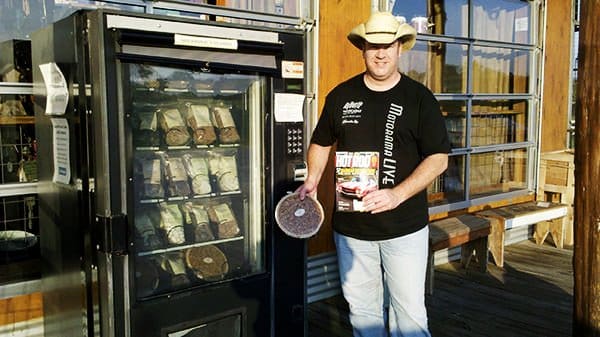
Pecan pie is a southern favorite. Berdoll Pecan Farm in Cedar Creek, Texas sells pecan pies out of a vending machine to make it easy for customers to buy this hometown favorite. If you know farmers or restaurants that have a customer favorite, you might want to share this example with them to help make more money while delighting customers.
45. Vending Machines for Water
Bottled water is a necessity in a lot of places. You can offer:
- Flavored Water: There are a ton of varieties of flavored water. Check out some of the most popular ones on Amazon.
- Sparkling Water: La Croix, Perrier, and S. Pellegrino are popular sparkling water brands on Amazon.
- Vitamin Water: My personal favorite is the Acai-Blueberry-Pomegranate Vitamin Water, you’ll find no shortage of flavors to add to a vending machine.
- Plain ol’ Water: Order pallets of bottled water and sell them to make money for your vending machine business.
There are even vending machines that can fill larger containers.
46. Stamps Vending Machines
These aren’t around much anymore, but the old stamp vending machines were used to make it easy for people to get stamps for the mail. You might still be able to find them, but I wouldn’t recommend a stamps machine for a vending business in today’s digital world.
47. Crane Merchandising Systems
This manufacturer creates vending machines, self-service kiosks, and payment validators for slot machines. If you want to expand vending machine offerings to other industries, you might want to check out Crane Merchandising Systems.
48. Vending Machine Games
Claw machines that people put in money to try to get toys, jewelry, or electronics are a popular sight at arcades, skating rinks, and other kid attractions. They can be really fun for kids and parents, too. You can find a variety of vending machines like this in Candy Machine’s Game Room.
49. Nail Painting Robot
A vending machine that can paint fingernails? Yep! And they’d be great to offer in places like wedding venues and high-end hotels where someone might want their nails done quickly. Check out this video by Clockwork. You can apply to lease their machines on the site.
50. Carvana Vending Machines
Did you know you can sell cars via Carvana vending machines throughout the country?
They partner with car dealerships to sell cars, and anyone who refers someone to them can receive $100 per purchase. This can be a great way to supplement income to your vending machine business. Get a referral code, create QR code stickers, and add them to your snack vending machines (or any machines). Find out more about Carvana.
51. Newspaper Vending Machines
Coin-operated, old-school machines were once prevalent in places with heavy foot traffic. This style made it convenient for people to get the daily newspaper. Most of these vending machines were owned by newspaper delivery companies and serviced by their top-performing delivery route drivers. The picture below is an example from Vending Connection.
52. Book Vending Machines
You can place book vending machines in places with plenty of foot traffic like schools, malls, daycares, or anywhere with kids that might want a new book to read. You might also have success with placing them in airports to give travelers something to do. Consider a kids’ book vending machine like the one pictured below. You can get it from Global Vending Group.
53. Photo Booth Machines
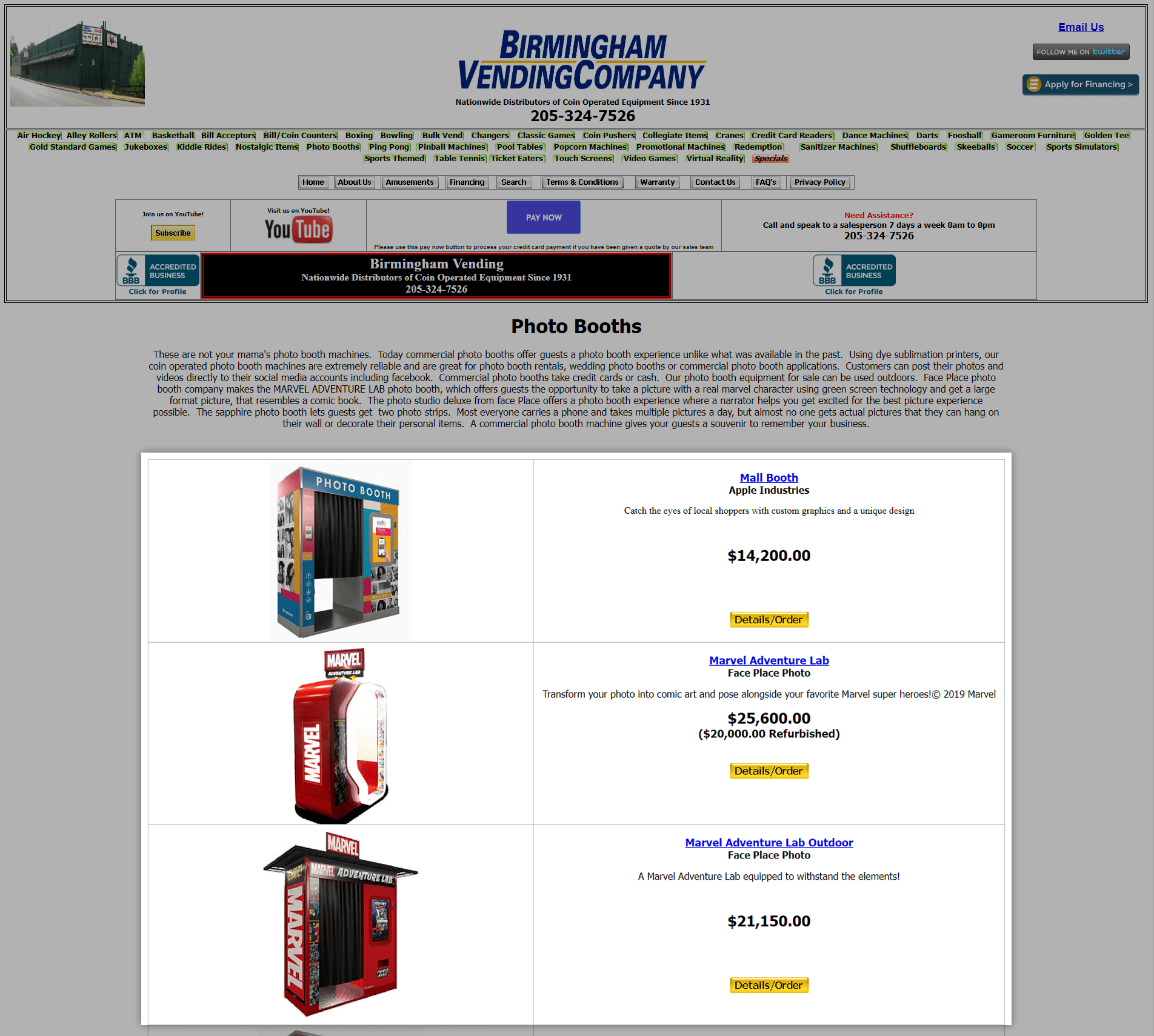
These machines are great for sports events, amusement parks, or anywhere people are celebrating. Customers love taking fun photos with each other. You can find various types of machines on Birmingham Vending. I want to check out the Marvel Adventure Lab and turn my family into superheroes.
54. Cannabis Vending Machines
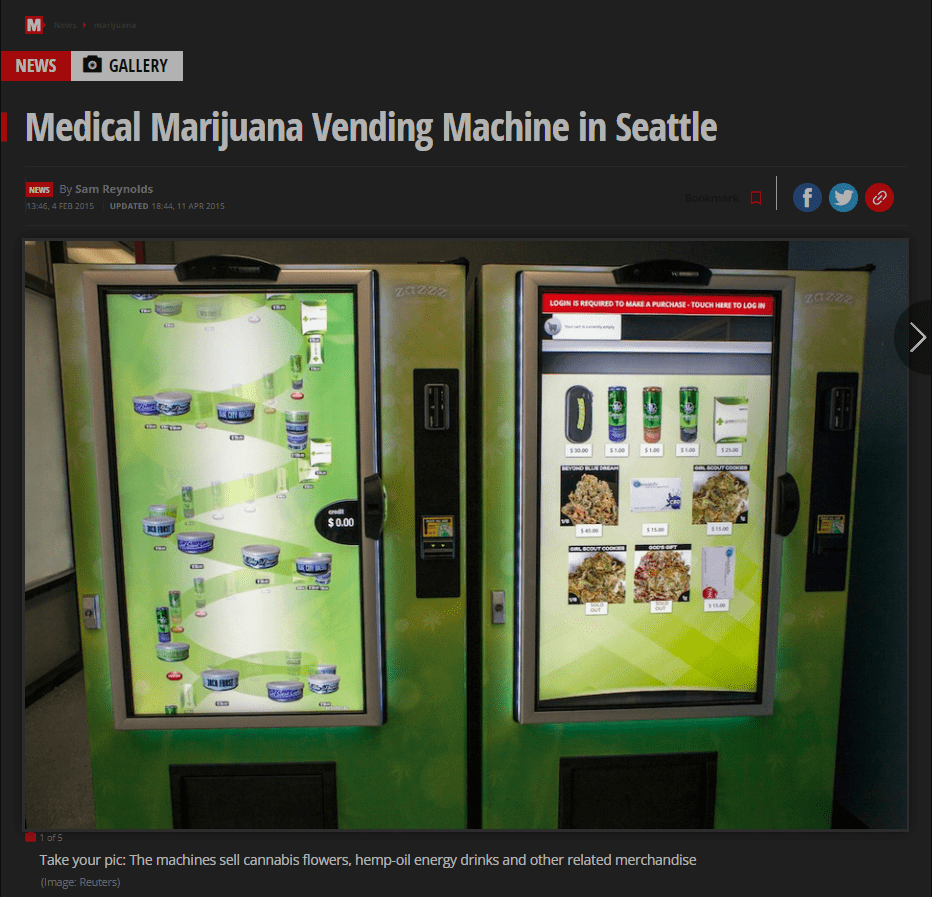
If you live in a state with legalized marijuana and have the proper licensing, you could offer cannabis vending machines from American Green. The marijuana vending machine is a climate-controlled dispensary that even checks ID.
55. Mold-A-Rama
Imagine a machine that could make plastic figures, before 3-D printing. The machines were built in the 1960s, but you can still find some operational in museums and zoos across the country. You can find information on Mold-A-Rama locations and supplies, but construction of the machines was discontinued in the mid-1960s.
56. Insurance Vending Machines
At one-time vending machines could sell life insurance in airports, but they were discontinued because lawsuits kept ruling against the insurance providers. If you start a vending machine museum, you might want to get your hands on one of these. Keep reading for more information on other types of vending machines.
57. CBD Vending Machines
In recent years, CBD has been used in almost everything… candy, lotion, soda, and various snacks. CBD is a health craze these days and there are vending machines for it, too. Green Box is a popular CBD vendor. You can find information about their automated dispensaries on their website.
58. Massage Chairs
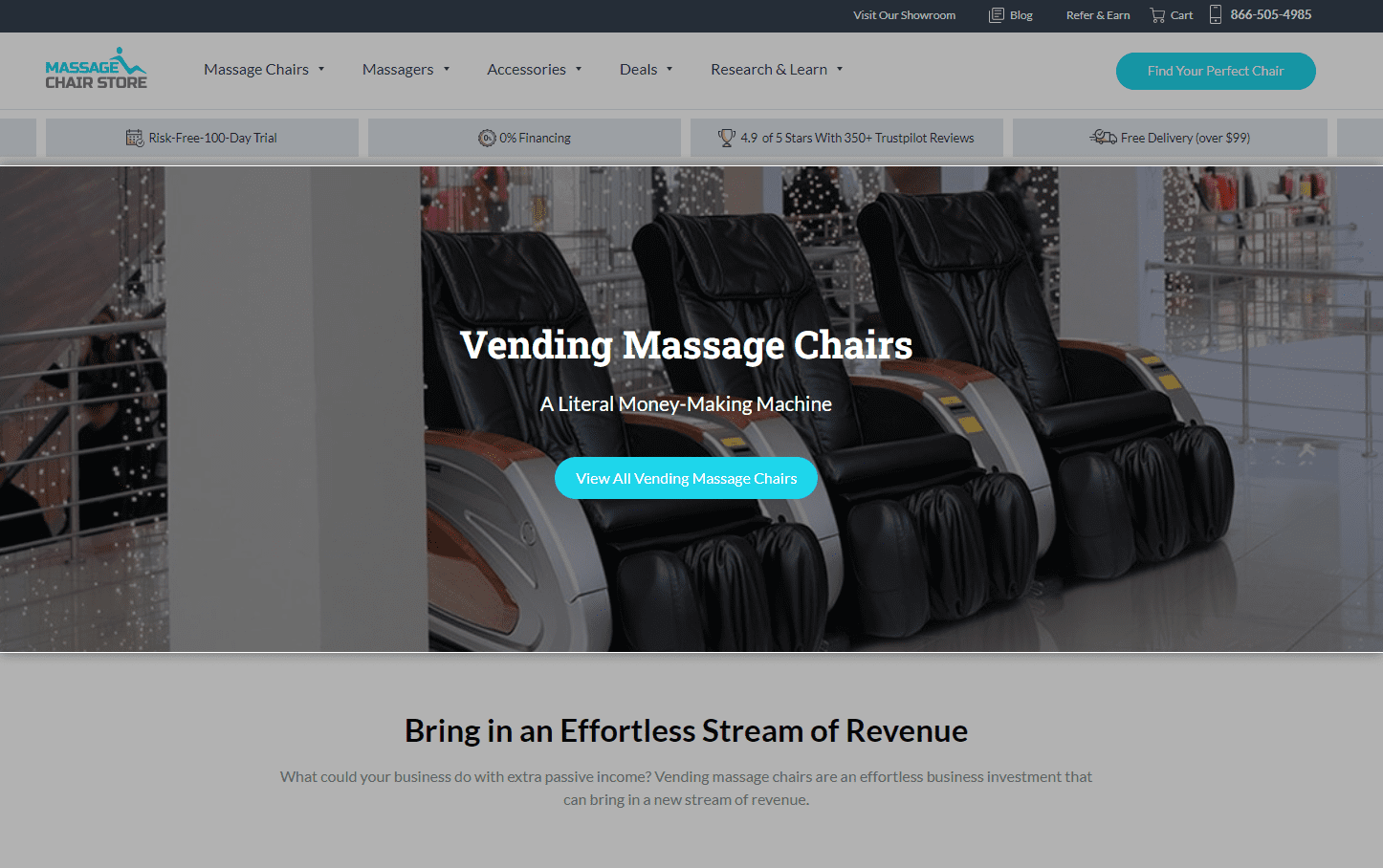
Sometimes life is stressful and customers need to relax. A vending machine business might consider offering several different machines in office settings, conference rooms, and airports. Consider these massage chairs from the Massage Chair Store to get customers relaxed after a hard day.
59. Personal Product Vending
You can offer hygiene items like toilet paper, feminine products, and other common low-cost items. Adding commonly purchased items to vending machines outside of large retail stores might add value to their customer services. You could act as the caretaker.
Want More Information About How to Start Vending?
Check out our other blogs about vending machines including:
Then sign up for our Vending Machine Bootcamp.
Keep Your Vending Machine Fleet Tight
Now that you know about the various types of vending machines, choose several different machines and become proficient with them. Adam told us:
You can check out the two brand he prefers on our vending machines for sale page where we help you find the best locations to buy a vending machine.
What are other examples of vending machines you’ve seen?
To learn more about starting a vending machine business, sign up for The Vending Bootcamp with UpFlip Academy!

